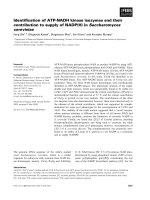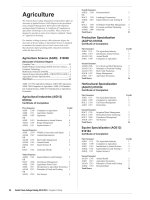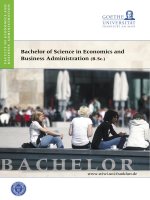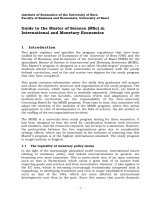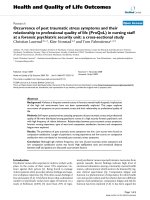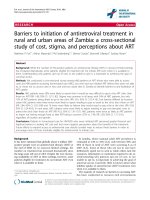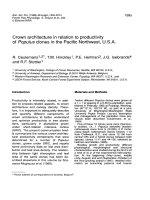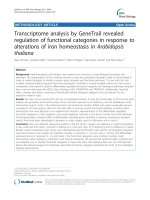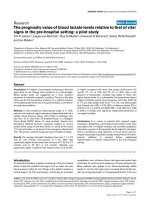Registered Nurse to Bachelor of Science Degree in Nursing (RN-BSN) Completion Program Faculty Handbook
Bạn đang xem bản rút gọn của tài liệu. Xem và tải ngay bản đầy đủ của tài liệu tại đây (1.75 MB, 205 trang )
P 49
Registered Nurse to Bachelor of Science Degree in Nursing
(RN-BSN) Completion Program
Faculty Handbook
…preparing RN to BSN nursing students to be a holistic practitioner who provides
comforting, compassionate, and equitable care, rooted in scientific evidence, responsible
for their intellectual development and personal growth, and well-being while cultivating a
sense of purpose that inspires commitment to lifelong learning and service.
One Alpha Drive
Elizabethtown, PA 17022
Phone: 717.361.3700
Email:
Approved 1/21; Revised 3/21;4/21; 7/21
2021 RN to BSN Faculty Handbook
CONTENTS
Handbook Purpose .................................................................................................................... 1
Message from the Director ....................................................................................................... 1
History of Elizabethtown College ............................................................................................. 1
Affirmative Action Statement ................................................................................................... 1
Accreditation .............................................................................................................................. 1
STRUCTURE AND GOVERNANCE ..................................................................................... 4
College Mission, Philosophy, and Goals ................................................................................. 4
The Mission & Goals of the School of Health & Human Professions (HHP) ...................... 5
The Mission & Goals of the School of Graduate & Professional Studies
(SGPS) ......................................................................................................................................... 5
Elizabethtown College Organizational Chart .......................................................................... 7
School of Health & Human Professions Organizational Chart............................................. 7
School of Graduate & Professional Studies Organizational Chart ....................................... 8
The Nursing Program Mission, Vision, & Goals ..................................................................... 9
Nursing Program Strategic Plan ............................................................................................ 10
RN to BSN Student Learning Outcomes ............................................................................... 10
BSN Essentials ......................................................................................................................... 10
The Nursing Program Philosophy.......................................................................................... 12
ANA Code of Ethics ................................................................................................................. 13
The Nursing Program Ethos ................................................................................................... 13
The Nursing Program Organizational Chart ......................................................................... 14
The Nursing Program Framework ........................................................................................ 15
Holistic Comfort Theory .......................................................................................................... 15
Faculty Job Description .......................................................................................................... 16
College Criteria for Appointment of Department Chair ....................................................... 17
Job Title: Director of Nursing ................................................................................................. 17
Job Title: Clinical Coordinator ................................................................................................ 19
Job Title: Lecturer .................................................................................................................... 22
Job Title: Adjunct Nursing Faculty ........................................................................................ 24
Job Title: Clinical Practice Experience Instructor (CPEI) .................................................... 25
2
2021 RN to BSN Faculty Handbook
FACULTY ORIENTATION .................................................................................................... 27
Faculty Guides.......................................................................................................................... 28
Faculty Professional Development ........................................................................................ 28
FACULTY GOVERNANCE ................................................................................................... 30
NFO & Standing Committees ................................................................................................. 31
Faculty Bylaws ......................................................................................................................... 31
Article I ...................................................................................................................................... 31
Article II ..................................................................................................................................... 31
Article III .................................................................................................................................... 32
Article IV .................................................................................................................................... 33
FACULTY POLICIES ............................................................................................................. 34
Faculty Workload ..................................................................................................................... 39
Practice Expectations.............................................................................................................. 43
Scholarship of Integration & Discovery Expectations ......................................................... 44
Teaching & Advising Expectations ........................................................................................ 44
Classroom & Pedagogy Expectations ................................................................................... 44
Professional Activity Expectations ........................................................................................ 47
Scholarship Expectations ....................................................................................................... 48
Exceptional Performance........................................................................................................ 49
Service: Nursing Program ....................................................................................................... 49
Service: College ........................................................................................................................ 50
Faculty Textbooks ................................................................................................................... 52
Faculty Online Resources ....................................................................................................... 52
COLLEGE FACULTY GOVERNANCE............................................................................... 52
College Faculty Organization .................................................................................................. 52
Faculty Constitution ................................................................................................................ 53
ARTICLE I: ACADEMIC & PROFESSIONAL GOVERNANCE...................................... 54
ARTICLE II: STANDING COMMITTEES ............................................................................ 60
ARTICLE III: BYLAWS .......................................................................................................... 66
Amendment Procedures ......................................................................................................... 67
Election Procedures................................................................................................................. 68
3
2021 RN to BSN Faculty Handbook
CHAPTER 2: DUTIES & PRIVILEGES OF THE FACULTY ........................................... 69
Search/Appointment/Orientation .......................................................................................... 71
Personnel Records................................................................................................................... 72
Responsibilities/Expectations ................................................................................................ 72
Expectations by Rank .............................................................................................................. 73
Department Expectations ....................................................................................................... 73
Institutional Expectations ....................................................................................................... 74
Off-Campus Activities for Remuneration .............................................................................. 74
Absence from Duty .................................................................................................................. 74
Teaching Load .......................................................................................................................... 75
Reappointment/Promotion/Tenure ....................................................................................... 76
Non-reappointment of a Probationary Faculty Member ..................................................... 73
Promotion ................................................................................................................................. 78
Tenure ....................................................................................................................................... 79
Promotion & Tenure Procedures ........................................................................................... 80
Criteria for Tenure & Promotion ............................................................................................. 91
Academic Promotion to the Rank of Associate Professor ................................................. 92
General Policies Regarding Termination of Tenure Appointments ................................... 93
Release & Retrenchment ........................................................................................................ 94
Faculty Retrenchment ............................................................................................................. 96
Procedure for Financial Emergency ...................................................................................... 98
Appeals ..................................................................................................................................... 98
Furlough .................................................................................................................................... 99
CHAPTER 3: FACULTY SPECIAL FINANCIAL MATTERS, BENEFITS, LEAVES 99
Compensation .......................................................................................................................... 99
Failure to Meet Standard Professional Evaluation (SPE) .................................................... 99
Salary by Rank .......................................................................................................................... 99
Compensation .......................................................................................................................... 99
Compensation for Supervision of Research Experiments ................................................ 101
Recognition Awards .............................................................................................................. 101
Merit Awards .......................................................................................................................... 101
4
2021 RN to BSN Faculty Handbook
Procedures ............................................................................................................................. 101
Appeals of Merit Award Decision......................................................................................... 102
Senior Merit Awards .............................................................................................................. 102
FACULTY BENEFITS .......................................................................................................... 103
Sick Leave ............................................................................................................................... 103
Family Sick Leave Bank......................................................................................................... 105
Withdraws ............................................................................................................................... 105
Faculty Family & Medical Leave ........................................................................................... 106
Junior Leave ........................................................................................................................... 108
Remuneration ......................................................................................................................... 111
Sabbatical Leave .................................................................................................................... 112
College Faculty Professional Development ........................................................................ 115
Faculty Grant & Incentive Program ...................................................................................... 116
Moving Expenses ................................................................................................................... 121
OTHER.................................................................................................................................... 122
Endowed Professors ............................................................................................................. 122
Emeritus/Emeritus Status .................................................................................................... 123
Faculty Offices ....................................................................................................................... 123
Copyright................................................................................................................................. 124
Research Misconduct & Human Subject Protection ......................................................... 124
Intellectual Property............................................................................................................... 125
Grievance Procedure for Faculty ......................................................................................... 127
CHAPTER IV: ACADEMIC POLICIES, PROCEDURES & JUDICIAL SYSTEM ...... 129
ACADEMIC POLICIES & PROCEDURES ....................................................................... 129
Course Syllabi ......................................................................................................................... 129
New Course Proposals.......................................................................................................... 131
Experimental Courses ........................................................................................................... 132
Guidelines for Majors & Minors ............................................................................................ 134
Student Course Loads ........................................................................................................... 136
Grading System...................................................................................................................... 138
Grade Changes....................................................................................................................... 141
5
2021 RN to BSN Faculty Handbook
FERPA...................................................................................................................................... 141
Course Calendar .................................................................................................................... 141
Daily Class Schedule ............................................................................................................. 142
Cancellation of Class............................................................................................................. 142
ACADEMIC JUDICIAL SYSTEM ....................................................................................... 142
STANDARDS OF ACADEMIC INTEGRITY..................................................................... 143
Elizabethtown Pledge of Integrity ........................................................................................ 143
Advising System .................................................................................................................... 147
Building and/or Faculty Code ............................................................................................... 147
CHAPTER 5: POLICIES RELATING TO ALL EMPLOYEES ....................................... 148
Employees .............................................................................................................................. 149
EC Tipline ................................................................................................................................ 151
POLICIES ADDRESSING COMMITMENT TO INCLUSIVE EXCELLENCE ............. 151
Equal Opportunity & Affirmative Action .............................................................................. 152
Title IX: American Disabilities Act ........................................................................................ 153
Discrimination, Harassment, and Bullying .......................................................................... 154
Harassment ............................................................................................................................ 154
Bullying .................................................................................................................................... 155
Reporting Procedures ........................................................................................................... 156
Workplace Violence .............................................................................................................. 158
Whistleblower ........................................................................................................................ 159
Conflict of Interest ................................................................................................................. 159
Consensual Relationships .................................................................................................... 160
Background Checks............................................................................................................... 161
Performance Appraisal ......................................................................................................... 161
Exit Interviews ........................................................................................................................ 162
Disciplinary Action & Termination ........................................................................................ 162
Immediate Termination ........................................................................................................ 163
Termination ........................................................................................................................... 163
Nepotism ................................................................................................................................ 163
Alcohol & Drug-free Workplace ............................................................................................ 163
6
2021 RN to BSN Faculty Handbook
Smoke-free Workplace .......................................................................................................... 165
Absenteeism ........................................................................................................................... 165
Safety & Security .................................................................................................................... 165
Children on Campus .............................................................................................................. 165
Lactation ................................................................................................................................. 166
Review of Personnel Files .................................................................................................... 167
Loss Prevention ..................................................................................................................... 167
Break in Service ...................................................................................................................... 167
Change of Employment ........................................................................................................ 168
Address/Name Change......................................................................................................... 168
College Liability ...................................................................................................................... 168
Dress Code ............................................................................................................................. 168
Computer/IT Usage ............................................................................................................... 168
Electronic Communication .................................................................................................. 169
Weapons on the College Campus ....................................................................................... 169
Pet/Animal .............................................................................................................................. 170
EMPLOYMENT COMPENSATION BENEFITS............................................................... 170
HIPAA ...................................................................................................................................... 170
Disclosure of Health Information ......................................................................................... 170
Our Legal Duties ..................................................................................................................... 171
Complaints ............................................................................................................................. 171
Employee Retirement Income Security Act of 1974.......................................................... 171
Elizabethtown College Administrators ............................................................................... 172
ERISA Rights........................................................................................................................... 172
Retirement Plan...................................................................................................................... 173
Domestic Partnership Benefits ............................................................................................ 173
Medical Benefits .................................................................................................................... 173
Health Benefits for Adjuncts................................................................................................. 174
Disability Insurance ............................................................................................................... 174
COBRA ..................................................................................................................................... 174
Life Insurance ......................................................................................................................... 174
7
2021 RN to BSN Faculty Handbook
Dental Insurance .................................................................................................................... 174
Vision Insurances .................................................................................................................. 174
Vision Discount ...................................................................................................................... 174
Flexible Spending ................................................................................................................... 175
Health Savings Account ........................................................................................................ 175
Family & Medical Leave ........................................................................................................ 175
Reasons for Taking Leave .................................................................................................... 176
Bereavement Leave ............................................................................................................... 177
Jury Duty ................................................................................................................................. 183
Subpoena ................................................................................................................................ 184
Military Leave ......................................................................................................................... 185
USERRA................................................................................................................................... 186
Social Security ........................................................................................................................ 186
Workers’ Compensation........................................................................................................ 186
Claims .................................................................................................................................... 187
Tuition Benefits ...................................................................................................................... 189
College Store Discount .......................................................................................................... 189
Family Recreation .................................................................................................................. 189
Faculty/Staff Dining Room ................................................................................................... 189
Credit Unions .......................................................................................................................... 189
Daycare Arrangements for Child.......................................................................................... 190
Verizon Discount .................................................................................................................... 190
PROCEDURES ..................................................................................................................... 190
New Employee Orientation ................................................................................................... 190
Employee Grievance .............................................................................................................. 190
Identification Cards ............................................................................................................... 191
Payroll Procedure ................................................................................................................... 193
Reimbursement of Expenses ............................................................................................... 193
Mail Service ............................................................................................................................ 194
Telephone Service ................................................................................................................. 194
Car Registration ..................................................................................................................... 194
8
2021 RN to BSN Faculty Handbook
Keys ......................................................................................................................................... 194
Official Communication ........................................................................................................ 195
Emergency Communication ................................................................................................. 195
Snow & Inclement Weather .................................................................................................. 195
Emergency Action Plan ........................................................................................................ 195
APPENDIX I ........................................................................................................................... 196
Academic Practice ................................................................................................................. 196
College or University Copyright Ownership ........................................................................ 197
New Instructional Technology ............................................................................................. 198
Informed Allocation of Rights .............................................................................................. 199
APPENDIX II .......................................................................................................................... 199
Supervision of EC Tipline ...................................................................................................... 201
Confidentiality ........................................................................................................................ 201
Non-retaliation ........................................................................................................................ 202
General Complaints ............................................................................................................... 203
EC Tipline ................................................................................................................................ 203
HUMAN RESOURCE .......................................................................................................... 204
Standards of Conduct Policy ................................................................................................ 205
9
2021 RN to BSN Faculty Handbook
PURPOSE OF THE HANDBOOK
The Elizabethtown College Nursing Program Faculty Handbook is intended to be used as a
supplement to the Elizabethtown College Faculty Handbook & the SGPS Faculty Handbook to
guide faculty in meeting their academic responsibilities. Further, the handbook should be used as
a reference to guide new faculty with onboarding and transition into their roles. The contents of
the Nursing Faculty Handbook focus upon information related to the Nursing Department – the
faculty, students, and administrative team of the Department.
Message from the Director
Dear Nursing Faculty:
I would like to extend a warm welcome to you and to let you know how honored we are to have
you be part of our faculty! Elizabethtown College was founded in 1899 and is a unique place that
will cultivate your personal strengths, develop your passions for lifelong learning, and purposeful
work.
For over 121 years, Elizabethtown College has an outstanding record of academic excellence in
higher education. As a faculty member at Elizabethtown College, you are the heart and soul of the
college’s achievements and countless stories of student success.
Our approach to nursing education is transformational as we embark on a partnership with our
students deeply committed to success.
Together, we will work to deliver an exceptional education, with thought-provoking experiences,
and challenge the thinking of the students! The results will be transformational, meaningful, and
rewarding!
As your Director of Nursing for the RN to BSN program, I am here to serve you. I look forward to
learning and growing with you! I can’t wait to get to know and work with you! Thank you for
choosing Elizabethtown Nursing! Please do not hesitate to email (), call or text
(610-703-1515) if you have any issues, questions, or concerns.
~Blue Jays Always!
Lisa Homa, PhD, RN, CNE, CCRN-K
10
2021 RN to BSN Faculty Handbook
HISTORY OF ELIZABETHTOWN COLLEGE
Elizabethtown College was chartered in 1899 by members of the Church of the Brethren who
were interested in establishing an institution of higher education for their denomination in eastern
Pennsylvania.
As expressed by the founders in the charter, the purpose of the College was "to give such
harmonious development to the physical, mental, and moral powers of both sexes as will best fit
them for the duties of life and promote their spiritual interests." While expressed in different
words, the purpose of the College today still embodies the essence of this educational
philosophy.
The Commonwealth of Pennsylvania granted a charter on September 23, 1899. Classes were
held for the first time the following year. During its early years, limited enrollment and finances
hampered the general development of the institution.
Supported initially by contributions from individual churchmen, the College in time became the
responsibility of the Eastern (now the Atlantic Northeast) and Southern District of Pennsylvania of
the Church of the Brethren. The Church Districts officially assumed the responsibility for
operating the College in January 1919. With the advancing years, the College grew in the size of
its enrollment, the extent of its physical facilities, and the quality of its academic program.
Formal accreditation was granted in 1921 by the Pennsylvania Department of Public Instruction
and in 1948 by the Middle States Association of Colleges and Secondary Schools. The rate of
growth increased significantly from the end of the Second World War. Student enrollment has
more than quadrupled since that time. The academic program has been expanded and is
continually revised to meet changing needs of students.
Our Church of the Brethren Heritage
Founded by the Church of the Brethren, Elizabethtown unhesitatingly supports the free
expression of religion for all individuals and groups. In addition, the College is committed to
providing an environment that affirms human differences and similarities by encouraging
students to examine, recognize and promote diversity related to national origin, religion,
race/ethnicity, gender, disability, sexual orientation, age, and socioeconomic status.
In 1993, the Church of the Brethren relinquished its governance role at the College. Since then,
Elizabethtown has been governed by an independent Board of Trustees. The College's bylaws call
for eight of 42 Board positions to be Church of the Brethren members. They are elected by the
Board, not the church. Three church executives serve ex officio without vote.
The campus community takes pride in the fact that its foundational values have become
embedded in the life of the College. The commitment to peace, non-violence, social justice and
human dignity are manifest in the Center for Global Understanding and Peacemaking, the Ware
Colloquium on Peacemaking and Global Citizenship, the Young Center for Anabaptist and Pietist
Studies, and the increased emphasis on study abroad, civic engagement, and peace and justice.
Launched in 2004, the Center for Global Understanding and Peacemaking focuses on
11
2021 RN to BSN Faculty Handbook
international programs, peacemaking, and civic engagement. Every year, the Center supports
more than 100 students who study abroad, 45 international students who take classes at
Elizabethtown, and more than 1,200 students engaged in service and outreach locally, nationally,
and internationally. Through these experiences, it provides opportunities for students to interact
with cultures and peoples different from their own while they develop a sense of their
responsibilities as global citizens.
The Center for Global Understanding and Peacemaking presents programming associated with
the Ware Colloquium on Peacemaking and Global Citizenship. The annual Ware Lecture on
Peacemaking—a highlight of the Ware Colloquium—brings notable speakers to campus. In past
years, the lecture has been presented by Mary Robinson, the first woman president of Ireland and
former U.N. high commissioner for human rights; F.W. de Klerk, Nobel Prize recipient and former
president of South Africa; Jody Williams, Nobel Prize recipient and chair of the International
Campaign to Ban Landmines; and Terry Waite, former hostage negotiator and cofounder of Y
Care International and Hostage UK.
The Young Center for Anabaptist and Pietist Studies, named for Dr. Galen S. and Jessie M. Young,
is an internationally recognized scholarly research institute that fosters contemporary and
historical investigations of Anabaptism and Pietism, the theological traditions from which the
Church of the Brethren developed. The Center seeks to interpret the cultural and religious heritage
of groups emerging from these movements through exhibits, public lectures, workshops, and
conferences. The Center's staff regularly teaches undergraduate courses, offers occasional
public lectures, and directs research projects. Its Fellows Program supports junior and senior
scholars and graduate students on leave from other institutions.
AFFIRMATIVE ACTION STATEMENT
The College is committed to ensuring equal opportunity in all employment Affirmative Action
decisions, policies, and practices, and in educational programs and activities. In keeping with the
historical values of Elizabethtown College, the College endeavors to treat all employees with dignity,
justice, and fairness. The College strives to provide equal opportunity and an atmosphere free of
discrimination. Elizabethtown College does not discriminate based on gender, race, color, religion,
age, disability, marital status, pregnancy, veteran status, national or ethnic origin, ancestry, sexual
orientation, gender identity and expression, genetic information, possession of a general education
development certificate as compared to a high school diploma, or any other legally protected status.
This commitment applies but is not limited to decisions made with respect to hiring and promotion,
in the administration of its educational policies, scholarship and loan programs, and athletic or other
College administered programs. Discriminatory acts of any kind are strictly forbidden.
To access the full policy;
12
2021 RN to BSN Faculty Handbook
ACCREDITATION
The baccalaureate degree program in nursing at Elizabethtown College are seeking initial
accreditation by the Commission on Collegiate Nursing Education (CCNE), 655 K Street, NW, Suite
750, Washington, DC 20001, 202-887-6791. A comprehensive onsite evaluation is expected in Fall
2021. Approval is not required from the Pennsylvania State Board of Nursing or from the Higher
Education (Section 6.1).
DISTANCE EDUCATION AGREEMENTS
State Authorization for Distance Education
Elizabethtown College is a participant of the State Authorization Reciprocity Agreement (SARA), a
voluntary, interstate agreement that establishes comparable standards for offering postsecondary
distance education across state lines. Member states recognize participating institutions that are
authorized in other member states. SARA establishes comparable national standards for interstate
offering of postsecondary distance education courses and programs. It is intended to make it easier
for students to take online courses offered by postsecondary institutions based in another state.
The State Authorization Reciprocity Agreement (SARA) is an agreement among member states,
districts, and territories that establish comparable national standards for interstate offerings of
postsecondary distance education courses and programs. It is intended to make it easier for
students to take online courses offered by postsecondary institutions based in another state.
Currently, all states (excluding California) plus the District of Columbia are members of NC-SARA.
Additional Information:
•
Activities covered by NC - SARA
•
NC - SARA Members
•
Elizabethtown College Complaint Procedures
Please note that SARA does not cover professional licensure or certification (see below). For more
information on SARA, please visit www.nc-sara.org.
ACCREDITATION BY THE MIDDLE STATES COMMISSION ON HIGHER EDUCATION
An institution of higher education is a community dedicated to students, to the pursuit and
dissemination of knowledge, to the study and clarification of values, and to the advancement of the
society it serves. The Middle States Commission on Higher Education (MSCHE), through
accreditation, mandates that its member institutions meet rigorous and comprehensive standards,
which are addressed in the context of the mission of each institution and within the culture of ethical
practices and institutional integrity expected of accredited institutions. In meeting the quality
standards of MSCHE accreditation, institutions earn accredited status, and this permits them to
state with confidence: “Our students are well-served; society is well-served.” (MSCHE, 2015. For more
information, visit the webpage />
STRUCTURE AND GOVERNANCE
13
2021 RN to BSN Faculty Handbook
College Mission & Goals
College Mission
Elizabethtown College provides a transformative educational experience that cultivates personal
strengths and develops a passion for lifelong learning and purposeful work.
College Philosophy
Elizabethtown College engages students in a dynamic, integrated learning process grounded in the
liberal arts. Challenged to take responsibility for their education, students at Elizabethtown embark on
a journey of self-transformation that involves intellectual, social, and personal growth.
The College is committed to educating the whole person within a relationship-centered learning
community where common goals are achieved through engagement in a rigorous academic
curriculum and thoughtful co-curricular experiences. Students are encouraged to develop and
challenge their own values, while seeking to understand and appreciate alternative perspectives.
Embedded in an ever-changing global context, the College promotes the developmental, collaborative,
and complex nature of learning.
In seeking to "educate for service," Elizabethtown College believes students can perform no greater
service than they do when sharing knowledge and creativity with others. Opportunities to strengthen
scholarship and leadership extend beyond the classroom, and students learn actively through
practical experiences and civic engagement.
The impact of an Elizabethtown College education is long-lasting and far-reaching because it is deeply
transformative. Students acquire new habits of mind and heart–some during the undergraduate
experience, others as students grow beyond college.
College Goals
At Elizabethtown College, students are inspired and challenged to:
o
Assume responsibility for their intellectual development, personal growth, and well-being.
Students will learn to sharpen their curiosity and become aware of the capabilities,
strategies and resources needed to learn.
o
Reason, analyze, and engage in critical thinking. Students will make, systematically
evaluate, and, if necessary, refute arguments and claims—both their own and those of
others.
o
Demonstrate thoughtful and articulate communication by applying knowledge in a variety
of contexts, including writing, speaking, listening, and interpretation.
o
Understand the creative process and its role in human expression and cultivate the ability
to make informed aesthetic judgments.
o
Navigate diverse cultural worldviews and perspectives, with the realization that differing
frames of reference influence analysis, communication, and behavior.
o
Make reflective ethical decisions and act with integrity to seek just outcomes with
14
2021 RN to BSN Faculty Handbook
relationships, communities, and society.
o
Apply and integrate different strands of learning and comprehend interconnections in the
process of gaining knowledge and experience.
o
Identify and cultivate a sense of purpose that inspires a commitment to meaningful work
in service to society.
School of Health & Human Professions (HHP)
Mission
To provide a transformative educational experience that develops highly competent professionals
who use their strengths and knowledge to help create change in the lives with whom they work,
both locally and globally.
Goals
Our faculty and graduates:
o
Uphold ethical and responsible professional standards
o
Practice-based on the best available knowledge and can contribute to that knowledge
o
Work for equity and inclusion for all peoples
The School of Human and Health Professions includes programs in Education, Exercise Science,
Occupational Therapy, Physician's Assistant, and Social Work.
School of Graduate & Professional Studies (SGPS)
Mission
Elizabethtown College School of Continuing and Professional Studies seeks to extend the
boundaries of the College’s learning community to include a broader and more diverse
population. The School expresses the values of the College’s mission through a commitment to
and advocacy of degree and non-degree academic programs for adult learners. In particular, the
School embraces the values of human dignity and social justice by widening access to quality
higher education for adults. In its programs and outreach, the School fosters a learner-centered
academic culture that expresses the College’s belief that learning is life-long and most noble
when used to benefit others.
Ethics Statement of SGPS
An integral component of courses in this program is student and facilitator self-disclosure (the
use of personal experiences) for the purpose of facilitating learning. The School expects students
enrolled in the program to honor confidentiality as it relates to student disclosure. No one should
ever use information, comments, or opinions expressed by a student or the facilitator during
classroom discussion in a manner intended to humiliate, embarrass, harass, damage, or injure
others in their personal, public, or business lives. Confidentiality requires that no information be
disclosed which would identify any individual. The student has a right to choose how much
15
2021 RN to BSN Faculty Handbook
information to disclose and a responsibility to respect the limits of disclosure set by other
students and facilitators.
SGPS Goals
o
Expand access to the unique benefits of an Elizabethtown College education to new
constituencies through innovative programming, formatting, and distance learning,
thereby increasing the number of non-traditional learners in the College's learning
community.
o
Develop and administer quality academic programs and activities, with the goals of
advancement of student learning outcomes and student achievement of programmatic
and institutional learning goals.
o
Offer support and guidance to adult students as they progress through their degree
program and achieve their goal of graduation.
o
Maintain and advance the liberal arts core values of Elizabethtown College.
o
Educate and develop the regional workforce through relevant professional and liberal arts
learning experiences that increase worker and employer productivity, and thus, to
"educate for service."
o
Help lead, by responsible example, the Elizabethtown College learning community in
successfully meeting the higher education challenges of the 21st century.
o
Support and advance the College’s strategic goal of stewardship of resources by
increasing departmental revenues while controlling costs in a fiscally responsible manner.
o
Value and nurture in the School’s staff the qualities necessary to meet these objectives
and the qualities necessary for full, personal development.
16
2021 RN to BSN Faculty Handbook
College Organizational Chart
School of Health & Human Professions Organizational Chart
Education
Social Work
Katy Hanna
Administrative
Assistant
Tamera Humbert
Dean of the School of Human
& Health Professions &
Professor of Occupational
Therapy
Carol Jean
Dietrich
Occupational
Therapy
Administrative
Assistant
Physician
Assistant
Stephanie
VanderMey
Heath &
Wellness
School of Human & Health Professions
Organization Chart
Exercise
Science
Administrative
Assistant
RN to BSN
Nursing
School of Graduate & Professional Studies (SGPS) Organizational Chart
17
2021 RN to BSN Faculty Handbook
Organizational Chart
August 2021
Dean
Jack Rice
Director for Curriculum
Development
Associate Director
Program Operations
Allison Mackley
Julie Walton
Instructional Design
Coordinator
Assistant Director
Kristie Anders
Erika Carpin
Williamstown
Communications
Etown Learning Design
Studio
Director of Admissions
Dave Woffington
Operations & A.P.
Program Leads /
Adjunct Faculty
Academic Advisor
Leigh Cassidy
Academic Advisor
Stephanie Hughes
Nursing Program Mission, Vision, Core Values, Goals, & Student Learning Outcomes
Mission
To improve the health of individuals and the global community through leadership, scholarship, and service
while advancing the art and science of nursing. This is accomplished by providing an inspiring, studentcentered, transformational educational experience deeply rooted in a rich liberal arts tradition. Learners are
transformed into holistic nurses where the mind, body, and spirit are interconnected, cultivating personal
strengths, and engaging in purposeful work.
Vision
To challenge the status quo in nursing education and become a global leader in online education.
Core Values
Accountability
Taking responsibility for one’s nursing judgments, actions, and omissions as they relate to lifelong learning, maintaining competency, and upholding quality patient care and outcomes
Cultural Congruence
18
2021 RN to BSN Faculty Handbook
The application of evidence-based nursing that is in agreement with the preferred cultural values,
beliefs, worldview, and practices of healthcare consumers and other stakeholders
Excellence
Strive for excellence by encouraging intellectual curiosity and innovation.
Professionalism
Demonstrating the highest ethical behaviors to all; responsible, respect, integrity, and advocacy,
healing the sick, nurturing the wounded, placing patients first, providing holistic care, and
educating new professionals.
Scholarship
Nursing practice is underpinned by evidence-based practice to improve health and transform
health care. Generate, synthesize, and disseminate scientific knowledge.
Service
Nurses work to alleviate the suffering experienced by individuals, families, groups, and
communities and remain actively involved in the community through service. Nurses provide
services that maintain respect for human dignity and embrace the uniqueness of each patient
and the nature of their health issues without restrictions, regardless of social or economic status.
Nurses have the responsibility to protect the people entrusted in their care, promote, and restore
health, prevent illness, and protect the people entrusted to their care.
Teamwork and Collaboration
The process of collaborating with colleagues united in accomplishing organizational goals.
Program Goal
The RN to BSN Program prepares the registered nurse to be a holistic practitioner who provides
comforting and inclusive care for all people, rooted in scientific evidence, where the student is
responsible for their intellectual development, personal growth, and well-being while cultivating a
sense of purpose that inspires commitment to lifelong learning and service.
RN TO BSN STRATEGIC PLAN FOR 2021-2026
Goal 1: Positive Culture: Create a healthy, positive work culture, where faculty and staff feel
free to share feedback, innovative ideas, and possess healthy characteristics where team
members flourish.
Goal 2: Dynamic and Relevant Education: Promote a dynamic academic environment to
support outstanding student outcomes that develop lifelong reflective learners and socially
responsible citizens who bring value to their community and workplace.
Goal 3: Inclusive Excellence: Create a culturally vibrant campus community that values
diversity, equity, and inclusion, where all community members achieve a sense of belonging.
19
2021 RN to BSN Faculty Handbook
Goal #4: Anchor and Partner Institution: Strengthen surrounding communities by building
capacity and maximizing partnerships to create significant economic and social impact.
Goal #5: Sustainable Growth: Transform the financial model to become a thriving institution by
leveraging core strengths, building capacity, and embracing growth initiatives.
RN to BSN Program Student Learning Outcome
The RN-BSN Program provides problem-based, student-centered learning that demonstrates the
acquisition of competencies and proficiencies from the Scope and Standards for Practice (ANA,
2015); Code for Ethics for Nurses with Interpretive Statements (ANA, 2015); The Essentials of
Baccalaureate Education for Professional Nursing Practice (AACN, 2008); Quality and Safety
Education for Nurses (QSEN, 2007); AACN (2012) white paper, “Expectations for Practice
Experiences in the RN to Baccalaureate Curriculum”; and Core Competencies in the
Interprofessional Collaborative Practice Competencies.
The graduate will: (Student Learning Outcomes)
1. Demonstrate effective communication and leadership strategies with the patient and
interprofessional team to ensure safe, holistic, quality care to patients, families, and
across the community.
2. Execute a culturally congruent plan of care that is patient-centered and invokes
optimal health promotion and prevention behaviors across the lifespan.
3. Apply knowledge from the liberal arts curriculum to inform nursing practice.
4. Assimilate professional code of conduct, nursing standards, and ethical principles to
foster sound clinical judgment and decision making.
5. Integrate research and evidence-based practices into the nursing process through the
collection, analysis, and interpretation of data to promote optimal health of individuals,
families, and communities.
6. Pursue a sense of purpose that inspires a commitment to lifelong learning and
meaningful work to enhance nursing practice.
7. Nurture caring and collaborative relationships with patients and families, the
healthcare team, and the community that promote positive patient outcomes.
The Essentials of Baccalaureate Education for Professional Nursing Practice
(AACN, 2008)
Essential I: Liberal Education for Baccalaureate Generalist Nursing Practice
As a Provider of Patient-Centered Care, use knowledge from biological, social, behavioral
science, and the humanities to apply the nursing process in care provision to diverse persons,
families, communities, and populations.
Essential II: Basic Organizational and Systems Leadership for Quality
Care and Patient Safety
20
